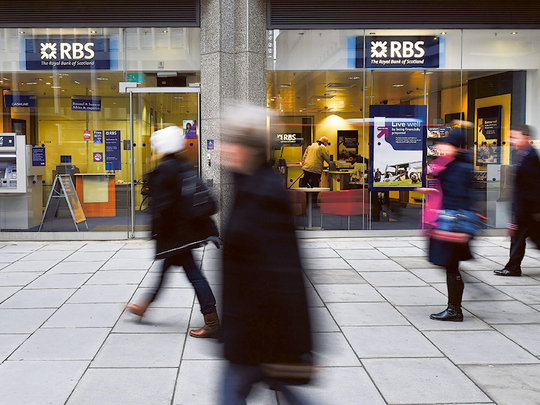
London: Royal Bank of Scotland (RBS) will drastically shrink its investment banking operations, pulling out of 25 countries across Europe, Asia and the Middle East and allowing the state-controlled lender to refocus on local lending in Britain.
RBS is seven years into an unprecedented corporate diet, shedding over 1 trillion pounds in assets as it retreats from the acquisitions that once made it the largest bank in the world and an enormous financial burden for British taxpayers when the credit bubble burst in 2008.
The bank reported a 2014 loss of £3.5 billion (Dh19.9 billion, $5.4 billion) on Thursday, hit by a write-down on the value of its US business Citizens and new charges relating to foreign exchange investigations and mis-selling.
Last year’s loss was a big improvement on the £9 billion deficit chalked up in 2013 but RBS has yet to turn an annual profit since the financial crisis. It has lost £49.5 billion over that period, more than the £45 billion taxpayers paid to bail it out in 2008.
To bolster capital and generate better returns, Chief Executive Ross McEwan said the bank’s investment banking division would reduce its presence in Asia significantly and withdraw from central and eastern Europe, Africa and the Middle East, cutting swathes of jobs and 60 per cent of assets.
“Let me be quite clear this marks the end of the stand-alone global investment bank model for RBS,” McEwan told reporters.
Rory Cullinan, RBS’s highly-regarded restructuring chief, will be made chairman of the corporate and institutional (CIB) division to oversee the retrenchment. Donald Workman, currently chairman of CIB, has been appointed executive chairman of RBS’s private banking franchise, Coutts.
Dividend talks next year?
Cutting back on expensive investment banking activities will reduce the amount of capital RBS has to set aside, raising its capacity to potentially return some money to shareholders.
The bank said by next year it hoped to be able to start discussions with UK regulator the Prudential Regulatory Authority (PRA) about resuming dividends.
Finance Director Ewen Stevenson said for those talks to happen the bank would need to be past the peak of litigation costs associated with a US probe into the sale of mortgage-based bonds, which he said would likely happen this year.
“We need to have confidence and sustainable profitability at that point which we believe we’ll have,” said Stevenson.
Shares in RBS were almost three per cent lower by 0935 GMT.
A poster child for what went wrong in British banking, RBS is under pressure to focus on lending to local businesses and consumers and to ensure that it does not return to the swashbuckling, big bonus days of the past.
In a letter to Howard Davies, confirmed on Thursday as the new chairman of RBS, Britain’s finance minister spelt out what he wanted.
“I look to you and Ross McEwan personally to ensure that the entirety of the bank’s business is conducted to the very highest ethical standards,” George Osborne wrote.
“My priorities for RBS are these: it is a British bank focused on the British economy, with lower bonuses and with a plan to get the taxpayers’ money back.” Conscious of the political sensitivities in the run-up to an election in May, McEwan has opted not to take a £1 million allowance, the second year running he has relinquished the payment. Overall, the bank paid out 21 per cent less in bonuses this year and the investment bank’s bonus pot was halved.












